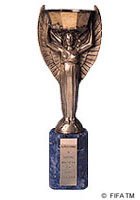


Meanwhile, FIFA will start a week-long inspection tour of the German venues for the 2006 finals on Monday. A delegation will visit Germany from May 5 to 12 to take a look at the 12 stadiums as well as the media facilities in Munich, where the international media center is being built.
"The goal is to give the inspectors a view of the facilities on the spot
to make sure we keep conforming to the FIFA standards, which are very high," said German organizing committee vice-president Horst Schmidt.
Bildunterschrift: Berlin, Cologne, Dortmund, Frankfurt, Gelsenkirchen, Hamburg, Hanover, Kaiserslautern, Leipzig, Munich, Nuremberg and Stuttgart have been selected as venues for the 2006 finals.
The opening game will be staged in a new stadium being built in Munich. The final will be in Berlin's Olympic stadium, which is currently undergoing a major facelift.
Blatter had no room to complain after his decision last year to give Oceania a guaranteed World Cup place by taking one away from the South Americans effectively formed the main basis for the discussion on Saturday and the subsequent decision against him. Responding to Blatter's decision in favor of Oceania, the South Americans demanded 36 finalists, with one extra place for themselves. European soccer's governing body, UEFA, supported them, and will take two of the extra places, with the fourth going to the winners of a play-off between teams from North America and Asia.
The plan looked doomed only 48 hours previously when FIFA's technical and football committees, the latter headed by Michel Platini, issued a stark joint warning that the proposed nine groups of four was 'not feasible'. They proposed a larger but more manageable tournament comprising of eight groups of five in a 40-team competition.
Platini, a European Championship winner and World Cup semi-finalist with France, said that the whole idea of seven best runners-up could not be decided simultaneously and that this would produce "an extended period of inactivity for some teams and could potentially also lead to arranged results.
The 2006 tournament will also be the first in which the number of competitors is not divisible by eight. That produces its own set of problems, leaving FIFA and the German organizers with the headache of how to reduce 36 teams to 16 for the later rounds. Nine groups of four, with the group winners and seven best-placed runners-up progressing, is unwieldy but is the likeliest solution put forward by the governing body's representatives at the meeting.
Gerhard Mayer-Vorfelder, head of the German 2006 organizers, said: 'The problem is to create a match program. It is extraordinarily complicated.'
However, the decision is one that will be roundly condemned by many in the game. Some have expressed their displeasure, calling the decision one born from the self-interest of the continental football federations and contrary to FIFA's well-known, all encompassing 'for the good of the game' mantra. Even FIFA president, Sepp Blatter, opposed the plan and had tried to kill it. The decision to go ahead is a severe personal blow for Blatter who was outvoted by an alliance which included the South Americans, who proposed it, and Europe, which will get two of the extra four places.
Germany's World Cup in 2006 will be the biggest ever after governing body FIFA approved an enlargement plan increasing the number of teams from 32 to 36. However, the decision has caused divisions within the game.
The World Cup in Germany in 2006 will officially be the biggest soccer tournament ever. The competition -- which in its early years was contested by 16 finalists, rising to 24 in Spain in 1982, and to 32 in France 98 -- will now feature 36 teams after world soccer's ruling body FIFA approved the enlargement at a meeting in Zurich on Saturday.
The new look World Cup, to be showcased in German stadiums throughout the summer of 2006, will display the talents of more than one sixth of all the world's teams - just over 200 are affiliated to FIFA. As a result, Germany's tournament will also be the longest World Cup in history, with added fixtures meaning the championships will go on for longer than the month it usually takes.











